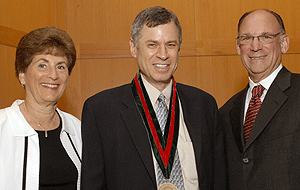On June 5, Larry A. Taber, Ph.D., became the first Dennis and Barbara Kessler Professor of Biomedical Engineering (BME) in the School of Engineering.
The ceremony, which capped the department’s 10th anniversary celebration, was in Uncas A. Whitaker Hall.

The Kesslers, both alumni of the University, are committed to biomedical engineering.
“We expect that some of the greatest medical achievements on the horizon will be in biomedical engineering,” Chancellor Mark S. Wrighton said. “Thanks to the great generosity of friends such as Dennis and Barbara Kessler, and superb faculty and students, Washington University will be at the forefront of those achievements, ensuring life-changing advancements well into the future.”
Taber is a founding member of the Department of Biomedical Engineering. His contributions to research and teaching include insights into understanding the role of mechanical factors that drive heart and brain development.
Previously, he worked on cochlear mechanics and the mechanics of crash injuries. His mathematical models for cardiac growth and morphogenesis represent pioneering work in better understanding congenital heart disease.
He is now beginning to apply similar approaches to studying the complex problem of brain folding.
Engineering dean Mary Sansalone, Ph.D., praised Taber’s contributions to the University and to the profession.
“The Department of Biomedical Engineering has achieved remarkable success in its first 10 years, which is largely due to our eminent faculty such as Larry,” she said. “Since the beginning, he has been an outstanding colleague who recognized the immense contributions that engineering can make to medical research.
“His work has contributed to important advances and a deeper biomechanical understanding of some of the most critical areas in embryonic development.”
Before joining the faculty in 1997, Taber was a professor of mechanical engineering at the University of Rochester. From 1978-1982, he was a research engineer for the biomedical science department at General Motors Research Laboratories. He is a fellow of the American Institute for Medical and Biological Engineering, and a fellow of the American Society of Mechanical Engineers; in 2005, Taber received ASME’s Richard Skalak Best Paper Award.
Taber’s research has appeared in approximately 70 journal articles and has been supported by grants from the National Institutes of Health and the National Science Foundation. Additionally, he has published the book “Nonlinear Theory of Elasticity: Applications in Biomechanics.”
His contributions to professional journals include having served as associate editor for the Journal of Biomechanical Engineering from 1996-2001. He is an associate editor for Applied Mechanics Reviews.
Frank Yin, M.D., Ph.D., the Stephen F. and Camilla T. Brauer Distinguished Professor of Biomedical Engineering and chair of the department, is a longtime colleague of Taber’s.
“Larry and I have known each other for many years and we share common backgrounds and interests,” Yin said. “We both started as aeronautical engineers who became involved in biomechanics. He has been an integral and key contributor to the department since Day One.
“His passion for mechanics and its application to important biomedical problems of embryonic development are unparalleled and help distinguish our department as one of the best in this field. I am pleased he is receiving this well-deserved recognition.”
Dennis and Barbara Kessler were inspired to give this major gift to encourage progress in medical research. Their hope is that research such as Taber’s will one day eliminate neurological genetic disorders such as dystonia, which afflicts their son.
Their dedication to supporting research includes being active in the Dystonia Medical Research Foundation (DMRF) for 26 years. Dennis is a past president and continues to serve on its board and Barbara leads the organization’s awareness campaign. They are founding members and are still active in the Chicago chapter of the DMRF.
Barbara graduated from the University with a bachelor’s degree in sociology in 1963.
Dennis earned a bachelor’s degree in industrial engineering in 1960 and a master’s degree in engineering administration in 1964, both from the University. For 34 years, he was an executive with Fel-Pro Inc., a company that manufactured and distributed gaskets, engine parts and industrial chemicals for the automotive industry.
Barbara also worked for Fel-Pro, writing for its magazine and planning special events. She is a longtime supporter of her congregation and the Art Institute of Chicago.
Now president of his own business, Kessler Management Co., Dennis provides leadership, management and succession planning expertise for family businesses.
In addition, he is a principal with Family Business Innovations. Dennis serves on the University’s Engineering’s National Council and is a member of the Chicago Regional Cabinet.
The Kesslers also support the Scholars in Engineering program. They live in Highland Park, Ill.